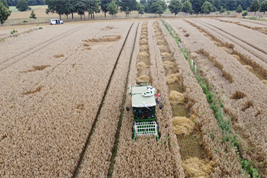15.07.2024

Researchers from the Leibniz-Centre for Agricultural Landscape Research (ZALF) are part of the new DFG research group FORMULA. The group is investigating the benefits of agroforestry systems for ecosystems and people. Over the next four years, different working groups within FORMULA will study biodiversity, water balance, soil health and pollination services in agroforestry experimental plots.
The new DFG research group FORMULA at the University of Giessen and ZALF is dedicated to the study of agroforestry systems. Agroforestry is the combination of trees or shrubs on the same agricultural land. The research will investigate the impact of these cropping systems on ecosystems and people. Over the next four years, the effects of cropping systems in the field as a function of the distance between crops and integrated tree rows will be analyzed. The research group will initially focus on questions related to water management, soil health, pollination services and changes in microclimate. The results of the agroforestry systems will also be analyzed in comparison to conventional field arrangements.
The trials will be conducted in Brandenburg and Hesse on plots where tree rows have already been planted in 2017, allowing researchers to begin with field studies immediately.
Several working groups are involved at ZALF
The research group is headed by Prof. Lutz Breuer, Professor for Land Use Systems at the University of Giessen. Several ZALF research groups are involved in the DFG research group:
- Dr. Joana Bergmann, working group "Sustainable Grassland Systems", investigates questions of biodiversity and the mapping of plant functional variation.
- Dr. Maren Dubbert from the "Isotope Biogeochemistry & Gas Fluxes" group is working on Soil-plant interactions of the water cycle.
- Dr. Mathias Hoffmann from the "Isotope Biogeochemistry & Gas Fluxes" group is working on greenhouse gas emissions and carbon sequestration.
- Dr. Kathrin Grahmann from the "Resource-Efficient Cropping Systems" group investigates nutrient fluxes.
- Prof. Sonoko Bellingrath Kimura (WG: "Provisioning of Ecosystem Services in Agricultural Systems").
- Prof. Heidi Webber ("Integrated Crop Systems Analysis and Modeling") and Prof. Frank Ewert (Scientific Director) are investigating the management, productivity and yields of agroforestry systems.
Research needs in agroforestry
Agroforestry systems are a form of land use that integrates trees or shrubs with crops, sometimes in combination with livestock. In the context of current challenges such as climate change and biodiversity loss, this form of land use is receiving increased attention in research. Agroforestry systems have the potential to improve microclimate, soil health and biodiversity. In addition, agronomic benefits are seen through an additional source of income from the rows of trees, thereby diversifying risk for agricultural enterprises. Shade from tree rows, increased pest and weed pressure, water competition, inflexibility and lower crop yields are seen as critical. However, there are few scientifically validated results on agroforestry systems, especially in temperate latitudes.
Announcement of the DFG on research group funding on July 02, 2024
The German Research Foundation (DFG) is funding a total of ten new research groups that will work on topics ranging from agroforestry to the automation of social communication. On July 2, the DFG's Joint Committee decided to fund ten new Research Units on the recommendation of the Senate. The funding will be provided in the form of a total of approximately 41.3 million euros for a period of up to eight years. The funding of Research Units enables scientists to address current and pressing issues in their fields and to establish innovative research directions. The DFG currently funds a total of 225 research groups.
Project partner:
- Landscape, Water and Biogeochemical Cycles at Justus-Liebig-Universität Gießen – Prof. Dr. Lutz Breuer
- Faculty of Landscape Management and Nature Conservation of Eberswalde University for Sustainable Development – Prof. Dr. Ralf Bloch
Funding:
Funded by the German Research Foundation (DFG)
Further Information:
